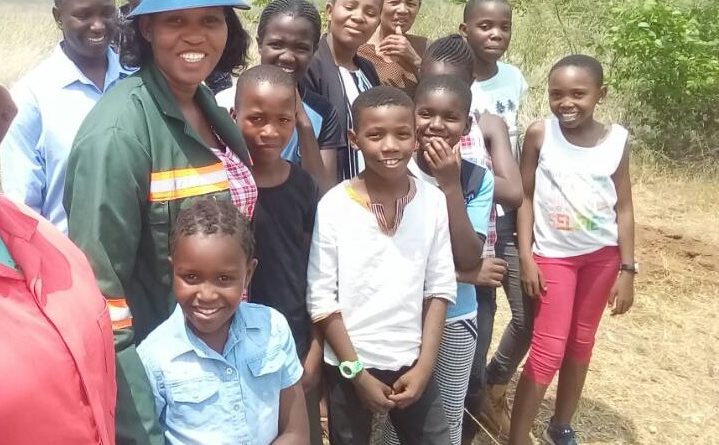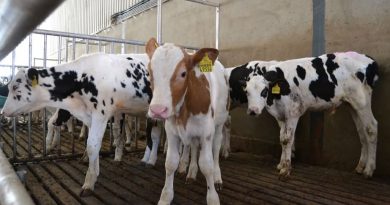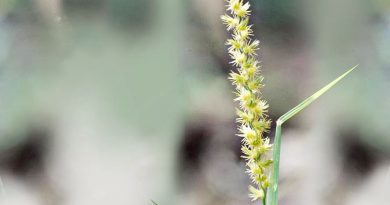Banker turned Farmer: Oreeditse’s winning formula
In it to win it, Seipone Oreeditse was drawn to Agriculture by her passion and will to change the status quo. Profound stories like hers prove more than ever that women’s place in the sector is secure, ANGELA MDLALANI writes.
Attracting people to agriculture is no small feat in Africa, where a booming young population is often put off by the image of punishing work and poor, weather-beaten farmers. But for Seipone Oreeditse (31), there was no avoiding the call-agriculture has always been her passion.
The pull was so strong that she had to quit her job to follow her heart. The mother of two now runs a farming business where the bulk of her crop is vegetables and maize, along with seedling and tree production as well as chicken production.
Last year (2017), she was lucky to get funding from the Forest Conservation Botswana (FCB), an organisation that funds sustainable projects aligned to climate change mitigation. You could say 2017 was her year of reckoning-the same year she and her husband applied for farm land and they were allocated a plot between her home village and the former mining town of Selibe Phikwe.
“I use horticulture and chicken production as sustainability plans for the nursery. Proceeds from there pays the workers and I carry out other developments in the farm. The plants take longer to grow, so as I await for them to grow I earn something from the other farming projects. I took up the other projects to boost the business and increase the chances of success and growth.” Oreeditse elaborates
It is her assertion that “one can never go wrong with Agriculture”. For a young woman, she is one to wave away the hardship that comes with being a farmer. Although women in Africa are key contributors to economic growth and global food security, they still face many challenges, land ownership being the main one. The greatest highlight of her life, she asserts is having access to her own land, which she says she owns with her husband.
Oreeditse is among a few young women who resorted to agriculture upon realising that permanent and well-paying jobs were hard to come by in the country. “I resigned from my job as a banker in 2014 to focus on farming. It is then that I talked to my husband about finding a piece of land for my farming business, we got the land, drilled a borehole and connected electricity” she said.
Already, the farm employs four staff, one of which has expertise in horticulture, which she says was a problem area with previous employees. “I have come to realise that there is quite a lot of profit in agriculture, but that comes with hard work and dedication. In this line of business one needs to have the right people to work with, people with the same vision and experience.” She says. She goes on to explain that when she started the people she had employed were not as passionate about agriculture while some were only passionate with chicken production and not with horticulture. She says it was hard finding someone with experience and her horticultural project suffered a bit. She has now found someone who like her, has the passion and on top of that, the relevant expertise and experience in horticulture and chicken production.
A few months ago, she enjoyed the pleasure of mentoring another youth who was on attachment at her farm. “The Department of Animal Production in Selibe Phikwe sent an intern who was here and complemented our team very well for those 6 weeks,” she added.
It gives her pleasure to play a role in the economy of the country and highlights the “I know how it feels like to not be fully employed.” She explains that having worked part-time jobs, she knows how it feels like to not have that stability. “I know there’s still a lot of people out there looking for jobs, and so far I have four people who I have employed and I hope the business grows such that I can take in more people.” She elaborates.
In Botswana, and perhaps the rest of Africa, women are constrained by cultural norms that perpetuate the perception that knowledge has to be transmitted to men first. Other factors include discrimination and the lack of acknowledgement of women’s role in agricultural supply chains amongst others. “The challenge is real, it is still very difficult for people to acknowledge that women are as capable as men. It is very discouraging sometimes when people pass by the farm and admire it and then ask whose it is, the moment I say it is mine they seem not to believe that a young woman like me can do this.” she asserts.
The mother of two is happy that a lot more women have risen to the challenge and some are even playing a leading role in the sector. “I see a lot of women especially young women venturing into agriculture. It shows that slowly but surely the society is changing their way of thinking and believing that agriculture is for men. It is a very big improvement and it is what I want to see in the future, more women venturing into agriculture and making a living out of it because it can be very profitable.” She says. Seipone believes that one can never go wrong with agriculture because people have to eat every day.
Despite the many challenges she has faced, including missing out on special moments in her children’s lives and family, she has no plans to quit. In fact Seipone would like to venture into Agro-tourism in the near future and she has already applied for change of land use to that effect.
“Very soon the place will have camping facilities and people and schools children can come view how every product in the farm is produced. I feel that way kids will learn and develop interest to go into agriculture in future” she concludes.



